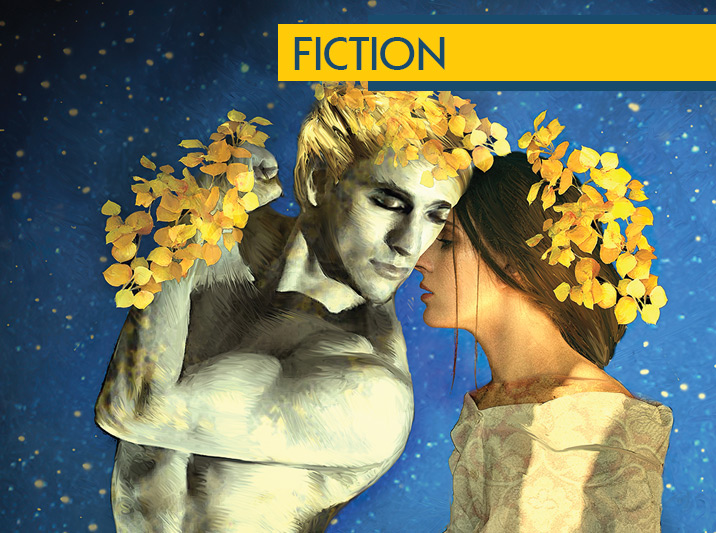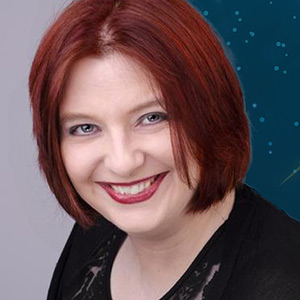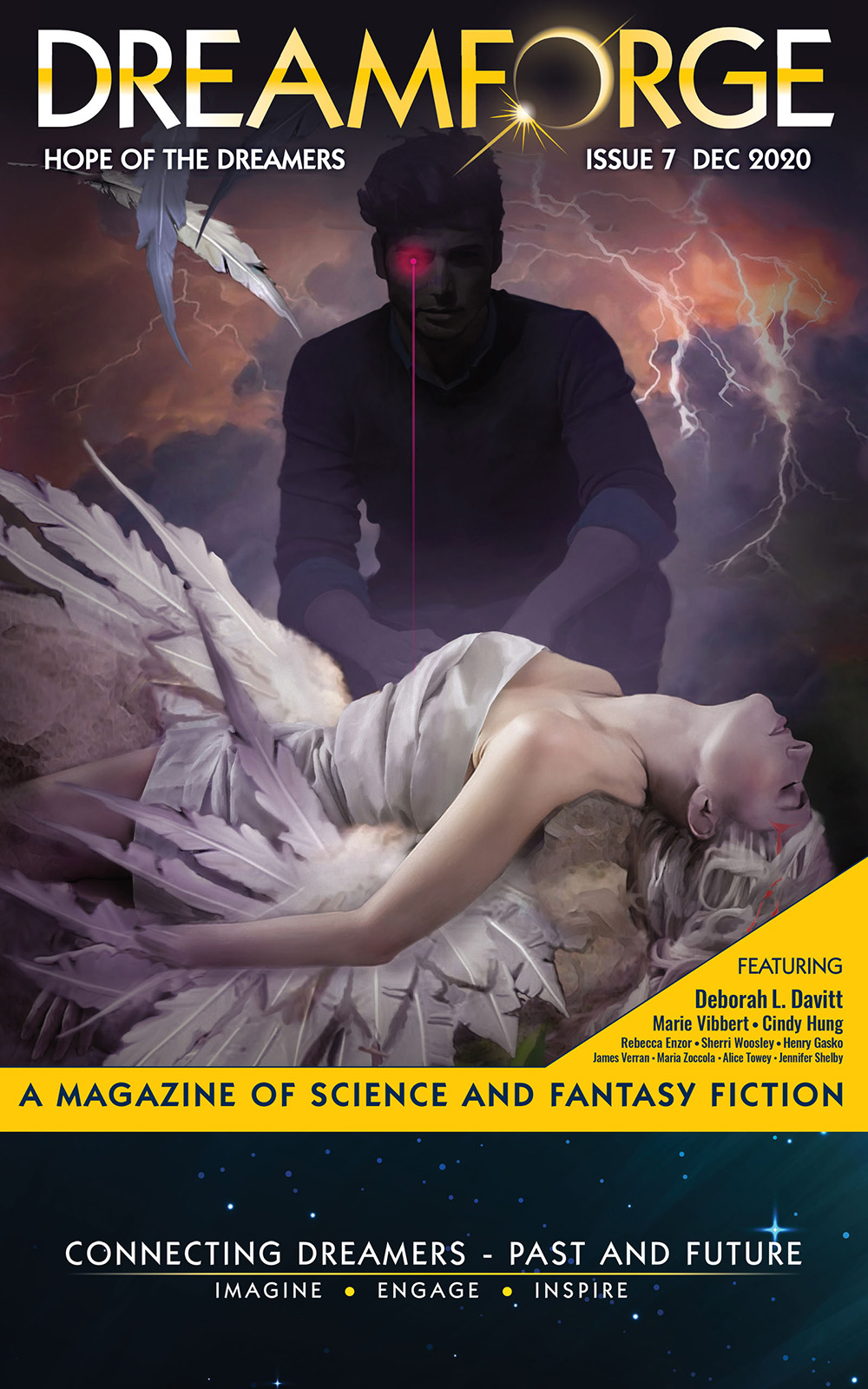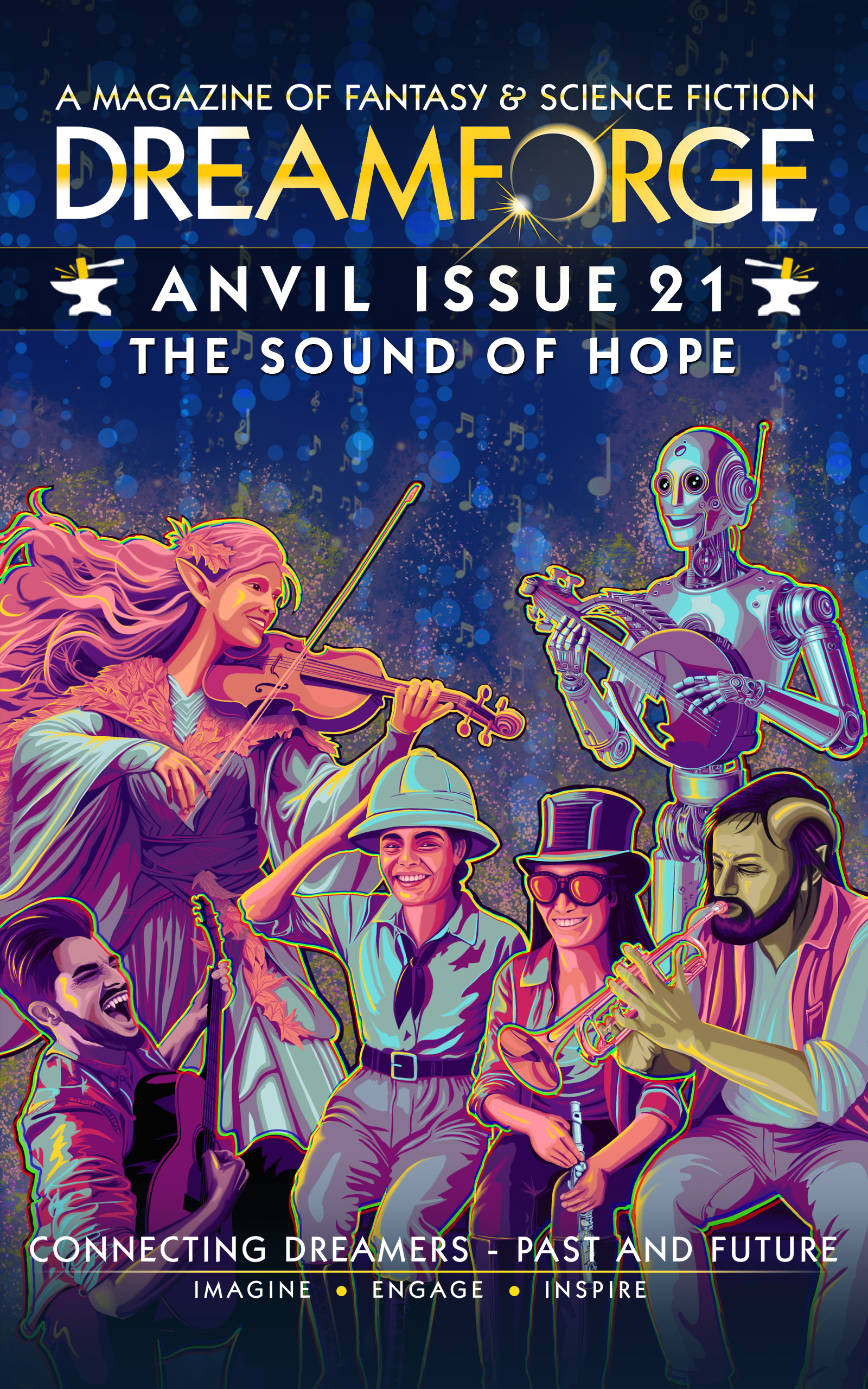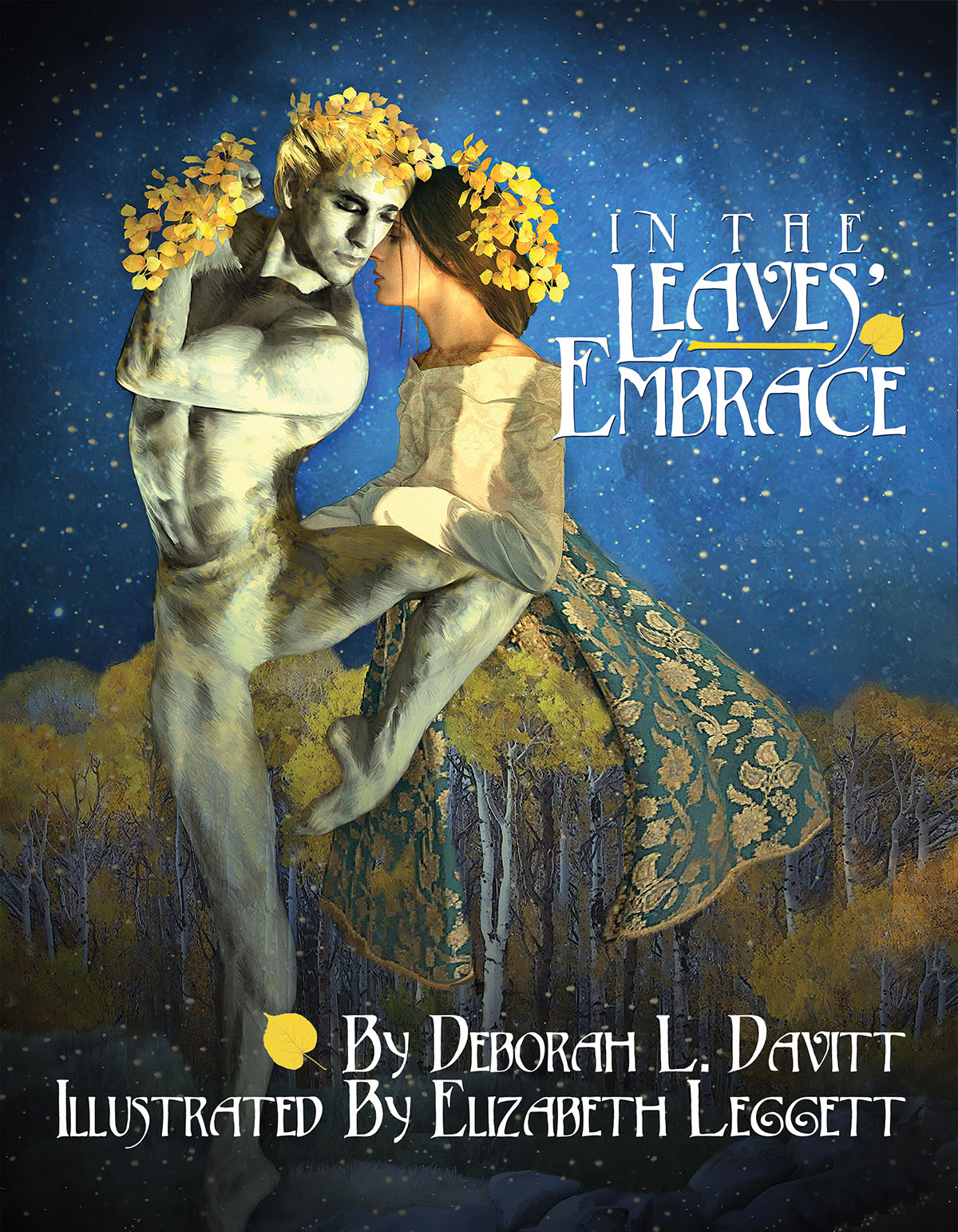
Sunlight slanted through rustling golden leaves; below, Rowan scrambled among the branches of the tree that shared her name, hands plucking its ruddy berries. “Another two baskets,” her grandmother called up. “Then we’ll have medicine to last all winter.”
Rowan groaned. She hated jerabinka cordial, but she couldn’t deny that it soothed her coughs when she caught cold. As she stood on the swaying limb, Rowan glanced towards the clearing’s edge, where tender white saplings gave way to their elders. In their shadows, a boy stood, his hair as gold as aspen leaves, his skin as pale as their bark. “Who’s that?” she called, pointing.
Grandmother turned to look, frowning. “Who?”
“Him!” Rowan insisted, pointing again.
But when she looked, the boy was gone, and Grandmother didn’t believe her when she described him— a boy who appeared so different than the villagers with their ruddy hair and wind-chapped skin. Even his clothing was different, seemingly made of fallen leaves.
She didn’t see him again for years. Until her grandmother died.
She sat on a stone wall as her father and grandmother argued, listening to the wind tossing branches overhead. Leaf-rustle always sounded like whispers. She wished it could drown out anger and pain. But human voices insisted, persisted.
“You’d orphan me, Mother?” her father demanded.
“You’re grown. You’ve your own family,” Grandmother replied, her voice rough. “In a year, I’ll be too crippled from rheumatism to walk. My hands will be too knotted to work. I refuse to be useless, Leppan.”
He set his hands on Grandmother’s shoulders. “Then we’ll care for you. I know you miss Father.” Rowan had never seen him weep before, not even over Grandfather’s cairn. “But we haven’t sent our oldest away to die since the Famine. Stay. We love you.”
Rowan felt her eyes sting. Her siblings were off helping her mother with chores. But Father had asked her to come with him. Why? To convince Grandmother? To bear witness? “Please stay,” she echoed, slipping off the wall and crossing to them. “Please, please stay.”
She felt her grandmother’s hand on her hair, light as an autumn-fallen leaf. “Sometimes love means letting go,” she told them. “Let me go. I must do this. I must go to the Mourning Grove.”
Her father hugged her as if he could hold back time with his arms. “Good-bye, Mother.”
He turned away, struggling for control. Grandmother looked down at Rowan, trying to smile. “My house is yours, Rowan. You’ll soon need a place of your own. Time fleets. I love you, dear one.”
And then she turned away, as if she couldn’t bear even one more farewell.
Rowan stood rooted. Desperate thoughts flooded her mind, drowning leaf-whisper. If I can find the right thing to say, I’ll change her mind. She followed, trying to find the words that might, like an incantation, keep her world safe and secure.
She’d ventured past the village palisade before, the wall made of sharpened stakes of alder and ash, in her grandmother’s company. But she’d never ventured so deep into the forest alone. Rowan looked for trail-markers other than her grandmother’s hunched back, and her eyes darted upwards, spotting threads hanging from branches overhead. Strings decked with shells from distant shores clattered against twine twisted with deer teeth. Rattling rhythmic warnings to the wind’s threnody.
Her grandmother never looked back. Rowan could have caught up easily; her grandmother used a walking stick, these days. But everything she could think to say sounded sniveling and selfish in her mind: Don’t leave. Your house is the only place I feel at home. Stay, though your heart bleeds and your body aches. Stay, because without you in it, my world won’t be a world.
She tripped over a root. As Rowan struggled to sit up, a hand caught hers, and she looked up into eyes as golden as the leaves overhead. “You shouldn’t follow any further,” the boy said softly. “Those who go to the Mourning Grove don’t return.” He looked older now.
Her face contorted. “Is there a monster there?” The adults rarely spoke of the Grove around children, and when they did, their faces filled with sorrow. She’d built an image in her mind of a dragon’s lair, surrounded by blackened, twisted trees, skulls hanging from the branches.
He blinked. “Not unless that monster is time.”
Rowan burst into tears. Confused, he pulled her to her feet. “I’ll take you to where you can look. No monsters. I promise.”
He took her up a hill, around which alder-stakes stood. A palisade of another type. Each stake held a deer skull atop it, worn to bone and antler. A warning. Go no further.
Rowan crouched, looking down into a sunlit meadow. “What are the white rocks?”
His breath tickled her ear. “You know, Rowan. They’re not stones.”
She didn’t know how he knew her name. But she knew the truth. “They’re skulls.” Skulls piled into cairns like the stones over Grandfather’s grave. She shut her eyes against the sight. Against the recollection of her family’s sorrow, as they gathered around the cairn. Against the memory of how empty she’d felt— not tearful like Grandmother, but aware of a void in the family, a void in herself, like the rotten heart of an old tree. And she’d felt shame at her own inability to weep. She’d felt more sorrow at the grief that Grandmother and Father felt, than over the death itself, and surely, that was wrong, wasn’t it? But today, over even the potential loss of her grandmother, panic gripped her, a hollow place inside sending her world spinning.
“Most from your Famine, when you sent the old away to die. Those who come now tend the bones.” He sighed. “They sit in the sunshine. Eat nothing, drink from the stream. A few decide to live. They leave and never return.”
She could see her grandmother enter the clearing. The way she forthrightly began tidying the bones. A half-laugh, half-sob, escaped her lips. That’s Gran. Even this, she’ll organize.
The boy touched her cheek, catching one of her tears. She turned, staring at him as if he’d stolen something precious. He didn’t notice, regarding the droplet like a jewel. “Her choice isn’t yours, is it?” he asked. “Come and see my brothers. They’ll want to meet you. You’re different.”
Grandmother decided. But she could decide something else, Rowan thought. She could decide to leave the forest and start a new life. But that’s probably a lie I shouldn’t tell myself.
As if in a dream, Rowan followed him. “What’s your name?” she called after him.
“Eidskal.”
Another clearing, where half a dozen boys, all Eidskal’s age, each as wheat blond as he, moved to encircle them. Touched her shoulders and hair. “Will you play with us? Dance in tree-shadow?”
“Where are your elders?” Rowan asked, blinking. She’d never known that there were other villages in the forest, and she felt too embarrassed to admit to this deficit in her knowledge. “Do you trade with my people?”
“No. Your people take from us.” A man appeared at the edge of the glade. He looked an older version of Eidskal. “We tolerate the losses as we can.” He shrugged. “In time, your people will likely move on, as others have before.”
Her mouth fell open. “You call us thieves?”
He advanced towards her, moving like a shadow over the grass. “No. I call you human.” A gentle look. “I understand that you have a loss of your own to mourn today. I’m sorry.”
She blinked, feeling oddly comforted by his voice, soft as the rustle of leaves. “How do you know?”
“What one of us knows, we all know.”
“Are you Eidskal’s father?” There seemed something dreamlike about this moment that made her accept the rest of his words without question.
A chuckle. “Yes. And no.”
Rowan frowned. “That isn’t an answer. That’s a riddle.” I hate riddles.
“He’s me. I’m him.”
She swallowed. “And your name?”
“Is Eidskal.” He gestured, and all the boys stood and waved. “We’re all Eidskal. All of us, going back to our father.”
Rowan nodded. “And he is also you, then?” She flushed, expecting him to shout that she’d been impertinent.
All the boys around her laughed, and Eidskal —her Eidskal, the first one she’d seen—leaned in and kissed her on the cheek. “She understands!” he called to the others, sounding delighted.
“No, I don’t!” Rowan wailed, still disconsolate from her grandmother’s decision, and bewildered by their words. Her world spun, and she’d had enough of wonder. “I want to go home.”
The older man nodded understandingly. “I’ll lead you there. Come along.”
She found her hand taken, and she followed this older Eidskal towards her village. Rowan wearied quickly; she hadn’t realized how long she’d walked, following her grandmother. Following Eidskal.
To distract herself, she looked up at this Eidskal, tall and golden beside her. One more valiant attempt at comprehension. “You say you’re him, and he’s you.”
“Yes. We’re all a part of each other.”
“That makes no sense.” Peevish as a child denied a treat. Halfway through her own sentence, Rowan caught the whining note in her voice and tried to smooth it away.
“It makes sense to us. Frankly, I’m surprised you perceive us. We’ve never met any of your kind who could.”
My kind. As if we’re something other than what he is. Is he a spirit? A god? “Eidskal —the other one— talked as if he knew all about the Mourning Glade. And the Famine.” She wasn’t sure that was a question.
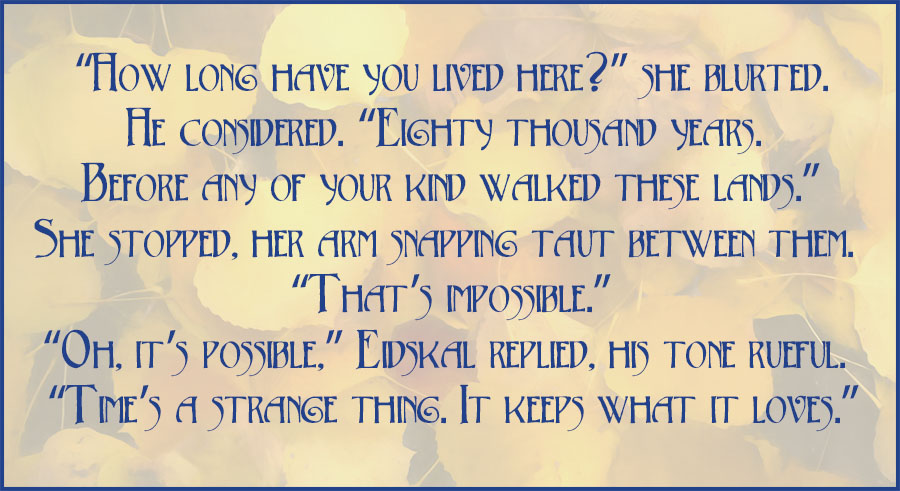
Another equitable nod. “We’ve been here a long time. He remembers everything that our otherselves knew. Even those who have gone to ashes and rot.”
Rowan didn’t know what to say. Every question seemed to bring her around in circles, back to where she’d started. “How long have you lived here?” she blurted.
He considered. “Eighty thousand years. Before any of your kind walked these lands.”
She stopped, her arm snapping taut between them. “That’s impossible.”
“Oh, it’s possible,” Eidskal replied, his tone rueful. “Time’s a strange thing. It keeps what it loves.”
“And time loves you?”
“It must. We remember when just a few miles to the north of here, there were walls of ice hundreds of feet high, and winter reigned year-round. The ground groaned with relief when the ice retreated. It rose up again when the weight of the ice passed. Soft and spongy like a fresh mushroom.” His eyes half-closed, and he sounded dreamy. “You could dig deep when the earth was loose.”
Rowan could feel it momentarily with him, a swirl of strange sensation. A feeling that the ground was open. Ready. That she could pour herself into it and suck nourishment from deep below. “Who drove winter back?” She knew the old tales of such things. Of brave warriors armed with flaming swords, fighting dragons that belched ice from deep within their throats.
His eyes opened. “No one. No quests. No heroes. This was when your people wore hides and hunted great tusked beasts. They couldn’t hunt winter or fight time. Things just changed.”
Rowan considered it for a moment. “For the better. Winter shouldn’t be forever. Everything needs spring and summer.”
He shrugged. “Perhaps. But when the long winter left, it took our future with it.”
“More riddles?” Rowan asked, feeling petulant once more.
Eidskal laughed. “Not really. But it’s not something that can be helped. Just endured.”
When her legs cramped, he carried her. She fell asleep on his shoulder, exhausted. And awoke on the doorstep of her parent’s house, with her worried mother picking aspen leaves from her hair. “You shouldn’t have run off into the woods like that!” Mother scolded, tears in her eyes. “It’s bad enough to have lost your grandmother today. We wouldn’t want to lose you, too.”
“I’m sorry,” Rowan replied automatically. “I didn’t mean to frighten you.” But her gaze drifted back to the forest’s shadows. Lingering.
After that, Rowan often played with the younger Eidskals under the trees. She didn’t tell the other villagers about the boys. Even her parents would think that she was making them up. They couldn’t, after all, see or hear them.
But her time of childish games soon had to be put aside; she read her grandmother’s book of cures and worked at distilling roots and herbs with her mother for the benefit of the village. Dyes for the weavers and tisanes for the sick. Her mother sent her to sit with the ill and the elderly. To feed them soup when their fingers shook too much to hold a spoon. And Rowan did it willingly, not wanting to see anyone make the walk to the Mourning Grove again. But her eyes often strayed to the windows, staring out to where she could see the forest-boys playing in the shade of the trees. And when she went out with her collecting basket to search for elderberries, white goosefoot, and knotgrass root, the Eidskals accompanied her, showing her the secret places where the best plants grew, the healthiest mushrooms.
When she was sixteen, the midsummer fires burned high, and all the boys and girls her age were expected to go, hand in hand. To kiss and play in the shadows at the edge of the fires, and come forward at dawn, green stains on their gowns and knees, to plight their troths for a year and a day, or until their first child was born.
Too serious for her years, too immersed in nursing the sick, Rowan had no one’s hands to clasp. She kept to the periphery, and when everyone was well-soused with birchbeer, she withdrew, walking softly under the aspen trees in the starlight.
“There you are,” Eidskal said, emerging from a pool of shadow, falling in step beside her. Older now. Taller. “I wondered when you’d leave.”
She made a rude sound. “You could have joined me.”
“Oh, a fine welcome I’d have found. They’d toss me on their bonfire.” He rolled his eyes.
“Pshaw. They’d never have seen you, and you know it.” Rowan stopped, reaching up. “Did you grow a beard?” She was almost certain that this one was her Eidskal. The first one. She’d learned to recognize one Eidskal from another by now— subtle variations in the shades of golden hair, little nicks and scars to the face.
He blinked. “I hadn’t noticed.”
“It’s scratchy as bark!” Rowan rubbed against the grain, obscurely delighted. At his baffled, confused expression, she laughed. “It’s Midsummer. The day all those my age are supposed to plight their troths and pick the path of their lives.” She’d had a sip of jerabinka cordial earlier, and it still coiled warm in her belly. Made her bolder. “If I could choose you, I would.”
“Choose me?” Eidskal repeated, blinking again. “How?”
She leaned up on tip-toe and pressed her lips to his. His beard scratched her face, and then his arms wrapped around her, hard as oak. When she pulled back, he looked dazed, and yet, sorrowful, too. “Rowan,” he said, stroking her face with rough fingertips, “I wish— I want nothing more than to see you bloom. To bloom with you. But…I can’t. We can’t. I’m not what you are.”
Crushed and ashamed, Rowan looked down. “I’m sorry, I thought you…I thought you felt as I did for you.”
He tipped her face back up again, so she could see his face in the moonlight. “I do. We do. We’ve never met any human like you. But we…we’re dying.” He sighed, again stroking her hair back from her face. “Slowly. We might not finish dying for another dozen human generations. But die we will. I will. With my brothers. We don’t want to spend all that time alone. We’d rather spend it with you. But time doesn’t love your kind as it loves ours. It will take you from us. And we can’t…” he paused, clearly hunting for words. “We can’t be with you in that way. Though I wish that we— that I could.”
“I don’t understand,” Rowan whispered, desperate. Trying to find the right words once again, an incantation to change her world. “What makes you different? I touch you, and I feel flesh. I look in your eyes, and I see love.”
“See us,” Eidskal said, pulling her close. “Know us, both as your people know us, and as we know ourselves.”
She closed her eyes. Felt herself reaching deep into the earth, pulling up water and food from the rich soil. Felt herself reaching for the sky, giddily breathing through her skin. Heard the rustle of thousands of voices in the leaves of her brothers. Brothers, yes, all brother-selves. Every one of them golden-leaved, the countless sons of a single father-tree, who’d fallen to earth, wind-born, from the love of grandfather and grandmother tree, separated by dozens of miles. All aware of each other, of the memories of long-gone father-tree. All seeking, yearning, for the voices of others of their kind. But they were all gone. Burned down by wildfires. Sapped by disease. Hewn by human axes. The young devoured by deer and beaver.
Rowan awakened, realizing that she sat high in the branches of an aspen, with no idea how she’d ascended so far up the tall, straight trunk. Her arms wrapped around it; her legs, too. But she felt no fear. Just sorrow, tears burning in her eyes. “Eidskal.”
—Yes. All of us. His voice whispered in her ears. —Entwined in root and bough. The ash and the rowans don’t speak. The oaks aren’t aware. There’s only us. And we have not bloomed in hundreds of years. We send out our roots, and little brothers are born on the verge, but we have no sisters. No wives. No one with whom we can talk, whose voice isn’t our own. Until you came. Some of us were angry when you were young.
“Angry? Why?”
—Because we’d waited ten thousand years for the sound of another voice, and when you came, you were human. You can’t bloom. You can’t send your spores to dance on the wind with ours. You can’t dig deep into the earth, and make sister-selves to whisper back to all of us. He sounded as dispirited as she’d ever heard him. —We will die without progeny. Without continuance. And worst of all, time will steal you from us.
She closed her eyes. Willed her perceptions back the way they’d always been. And when she lifted her lids again, she stood once more in the circle of his arms. “I will find a way,” Rowan promised him, her throat tight. “For you. For us. For…everything.”
Eidskal looked resigned. “There is no way,” he replied. “But we can at least have this time together.”
They spent that summer in each other’s arms. Rowan fed Eidkal jerabinka liquor, and he learned what made her body bloom and what made dew drench her inmost leaves. In fall, she whispered her farewell to him at the forest’s verge. To all of them, young and old, lined up in the saplings, watching as she took her place in a wagon leaving for the southern lands.
It took her a year to find a grove of aspen in which she could see nothing but sisters. She approached them, and they hid behind the tree-trunks, peeping out with wide, honey-gold eyes. “I mean you no harm,” Rowan called. “I’m here because one of your kind, a male grove, has no females with whom to bloom.” Besides me. “Please. May I take one of your saplings to him? I will plant her in my own dooryard, in a place with much sunlight. I will water her faithfully and keep insects and deer from her bark and branches.”
“Why would you do this?” a voice answered, and a woman ducked out from the forest shade. Tall and golden-haired and beautiful. Rowan felt scrubby beside her smooth elegance, like the berry-bright tree that bore her name.
“Because I love him,” she replied simply. Her throat tightened. She’d never said that word to any of the Eidskals. Love is a human thing. We love freely and indiscriminately. We can love a child. A cat. A dog. A flower. A forest.
A long, assessing look. “You may take one of us to him. Our name is Gjelle. Treat her as you would your own daughter, human.”
She dug up the sapling and wrapped its roots in cloth. As she did, an infant appeared, bawling and shrieking in pain on the ground beside her. Rowan dropped her shovel and lifted the baby with her mud-stained hands. Clasped the child close, weeping. “How am I going to get you home, without everyone in the wagons thinking I’ve gone mad, holding a babe to my breast that isn’t there? Cradling a tree to my heart?” she asked, shaking her head. “Do you need milk? I have none. Do I just keep your roots watered? Is that what I do?”
Laughter rustled from the trees around her. The Gjelles seemed to find her quandary amusing.
She bounced that babe on her knee discreetly, all the way from the lowlands to the mountains. Slept with the child cradled in her arms. And when she returned home, after greeting her parents and siblings warmly, she took Gjelle out into the dooryard of her grandmother’s house and planted her there. Waited till sunset, when Eidskal came out from under the trees to embrace her. And saw the look of wonder on his face as she showed him the child.
“Your bride, someday,” Rowan said, trying to hide her sorrow.
“Our daughter,” he corrected, wrapping his arms around both of them, and kissing her soundly.
By her mid-twenties, she’d gained a reputation as a wise-woman. She didn’t know how. She midwifed the children of her contemporaries, taking over that duty when her own mother fell ill. As each child was born, she started a new tradition, naming them under an aspen tree. Telling the villagers that the trees knew the children’s names, and that, bound together, they’d grow strong. They took that as eccentricity at first, and they humored her.
At least until the invaders came. She was the first to warn the village of their approach. Eidskal whispered of the raiders’ movements, and she guided her people into the tree-shadows. Kept the children hidden there, while she and the other adults picked up axes and scythes, creeping into position to ambush the enemy. Always guided by Eidskal, Rowan knew precisely where each invader was. Where they ran. Where they hid.
They killed every one of the raiders and threw their bodies down the hill into the Mourning Glade. And after that fearful night, her reputation as a wise-woman was sealed.
She buried her mother the following year, as well as some of the girls with whom she’d grown up. Not from death in childbirth, but from the fever thereafter. From being worn out from long nights spent nursing their own families.
Some of the widowers, after a decorous time, came calling at her door. She was the last eligible woman of their generation; if not her, they’d have to look to girls just old enough to attend their first bonfire to help care for young families.
“You should marry one of them,” Eidskal told her after she’d sent another suitor packing.
“You say that to me?” she asked, leaning against him in the dooryard. To anyone else, she’d appear to have her arm wrapped around a slender aspen tree. She knew where his self-tree was, deep in the forest. When he came to her, he didn’t mind if she touched one of his brother-selves as himself. None of them did. And she’d long put aside her confusion as to which self she loved. She loved her Eidskal. And that meant loving all of his selves with him. “I’m happy as I am. With you. Watching Gjelle grow up.”
He shook his head. She gave him a sidelong look and pressed the issue. “The others say this, not you.”
He looked away. Rowan sighed. “If they think that I should marry a human and bloom, tell them that you all should flower, and be one with Gjelle.” A hint of defiance in her voice. “Isn’t it the same thing?”
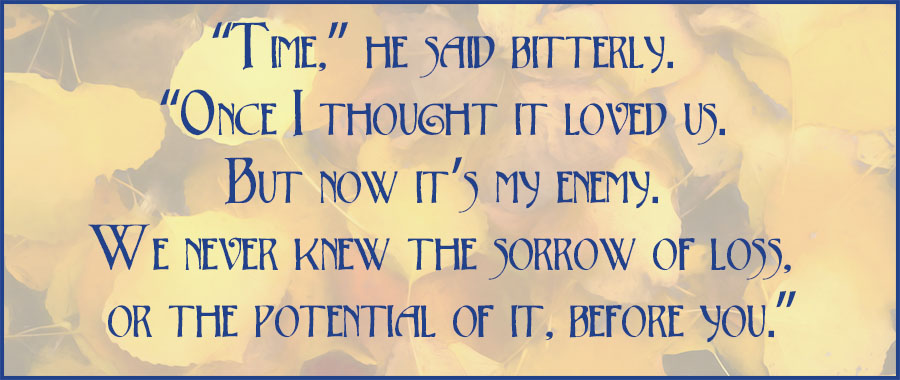
His eyes looked troubled, though he knew no shame or embarrassment. Those were human things. “Gjelle’s a sweet child. The little brothers adore her. We just…can’t. Something in us, in the sun, the air, the water…we can’t.” A sigh like the rustle of leaves in the wind. “But even if we can’t bloom, we wish to see you happy. Human lives are fleeting.” A pause. “And when you’re gone…we will be alone again.”
“Gjelle—”
“Gjelle is not you. And you are not Gjelle.” Emphatic rejection of the notion. “Time,” he said bitterly. “Once I thought it loved us. But now it’s my enemy. We never knew the sorrow of loss, or the potential of it, before you. Oh, there was sorrow when young brothers died. Sorrow when father-self fell in a storm. And there was sorrow in our aloneness, in the thought that we would never hear another voice answering ours. But not the sense of grief-that-comes, inescapable.” A pause. “If you had a daughter, they think there’s a chance that she’ll hear us. And while she wouldn’t be you, perhaps she’d be enough like you, that we could love her the way you love my brother-selves. Like, and not alike.” He sighed.
Thinking of a time in which she’d no longer exist disturbed her. Made her world spin with panic, her heartbeat rising in her chest as it hadn’t, even when the raiders attacked. Then, there’d just been necessity and survival. This was, as he said, inescapable. Rowan pushed the awareness away, focusing on the issue at hand. “That’s them. What do you think?”
He kissed her hair. “I want to see you bloom. I want to be with you for all the time that remains to me. I don’t want to see your white bones in some field, or feel my roots growing through your ribcage.” Quiet anguish in those words.
“Time fleets,” Rowan whispered, putting her head against his shoulder. “But we still have many summers before my winter comes. Time enough to find a way.”
Years passed. The children she delivered in the village grew to adulthood, each coming to believe that the aspens knew their names. Other trees they could fell and use for furniture and stakes in the palisade, but not the aspens, which they came to view as sacred. Some of the children even insisted that they could hear whispers in the leaves. Their parents scoffed, but Rowan smiled, and told them to listen closely. “They’ll tell you things,” she assured them.
“Secrets?”
“Truths.”
Gjelle grew into maturity, and sent out suckers of her own, spreading female trees through Rowan’s dooryard. When she looked out her windows, she could see golden-haired girls playing with the youngest of the Eidskals. And Rowan smiled.
One day, when Rowan’s hair was winter-white, she told one of the girls of the village, “You’ve been a good apprentice to me; you’ve learned all of my grandmother’s cures, and you’re ready to take over as midwife. Make sure no one hurts the aspens, you hear? Do that, and my house is yours.”
Weeping, the girl clutched her arm. “Please don’t go. Don’t take the path to the Mourning Glade.”
Rowan laughed softly and gave her a hug. “Dear child. I’m not going off to die. I’m not going anywhere. I’m going to be right here.” She gestured up at the canopy of leaves. “If you listen hard enough, I think you might hear my voice in the whisper of the wind. Look hard. See what’s real, and you’ll find me in the evening shade. I’ll be there. With the man I love.”
She left then, walking briskly through the forest till she found Eidskal’s tree. Her Eidskal, whom she’d first seen as a child near the rowan tree. Who’d comforted her when her grandmother made her choice. Who’d always been there for her, in every way.
He stepped out from behind the trunk, looking as golden as ever; he wouldn’t go gray for another forty years at least. “You’re sure?” he asked, as his brother-selves peeked out from behind their own trees.
“There are no guarantees,” Rowan whispered. “But I’ll take the chance, to bloom with you.”
They wrapped their arms around each other, and Rowan could feel him quaking as the wind stirred leaves from the forest floor. She closed her eyes, and let her mind slip into his. Felt roots reaching down deep into earth. Branches soaring up to drink sunlight.
It had always been in her, this awareness, but she’d always retreated from it, returned to her essential humanity.
This time, she did not.
When the forest bloomed in a shower of unexpected catkins, it spread a fine powder of gold across the village. The hunters searched the forest, looking for their wise-woman, but couldn’t find her. Yet, they found something else.
Aspens must grow separated from one another; their saplings only sprout in the sun. And yet here, a wonder— two aspens, straight trunks grown entwined, where surely they had never stood together before.
From their love, hundreds of new saplings spread out from the forest. Some were Rowan’s sister-selves, perpetuating and recapitulating their love forever. Some were the sons and daughters of Rowan and Eidskal. Their continuance, their legacy.
And in the village, many swore that they could hear voices on the wind, and see strange figures fleeting in the leaf-dappled shade.


